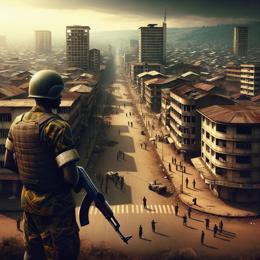Image created by AI
Escalating Violence in Mozambique Displaces Thousands as Insurgents Wreak Havoc
Mozambique is grappling with a resurgence of jihadist violence that has sent tens of thousands fleeing for their lives in the northern province of Cabo Delgado. This new wave of insurgent attacks, which began to intensify in January, persists despite significant security operations, posing serious humanitarian and economic challenges for the southeastern African nation.
The region plunged into crisis as reports emerged of a deadly attack on February 9, which local media state resulted in the deaths of as many as 25 soldiers from the Mozambique Defence Armed Forces. The loss strikes a heavy blow to the government’s anti-insurgency efforts, particularly during a pivotal election year.
Over 67,000 individuals have uprooted their lives in recent weeks, with a large number seeking refuge in the neighboring province of Nampula, while others are scattered in safer areas within Cabo Delgado itself. The situation appears dire for children and women, who, according to Guy Taylor of UNICEF’s Mozambique office, comprise more than two-thirds of those displaced.
Year-to-date figures compiled by Tertius Jacobs, an expert analyst at the Focus Group, confirm a disturbing uptick in violence. Fifty-six instances of insurgent assaults have been documented just two months into 2023, surpassing half the number of attacks recorded in the preceding year. The insurgents, notably targeting civilian establishments, also pose a significant threat to the vital EN1 highway, jeopardizing the transportation of commodities to the port of Nacala.
In the midst of the chaos, TotalEnergies, a French oil giant, has been aiming to resume work on a $20bn liquefied natural gas project in the region, which stalled in 2021 following a brutal Islamic State-aligned group assault. Patrick Pouyanne, TotalEnergies’ CEO, has emphasized the need for ensuring security prior to reinitiating the project to avoid the risk of subsequent evacuations.
Mozambique’s defense ministry has refrained from commenting on the issue, and ExxonMobil, contemplating another LNG terminal in Cabo Delgado, has yet to respond.
Strategic military interventions are anticipated as the Rwandan army, currently overseeing the zone encompassing the critical energy hub, is expected to broaden its role after the mandate of a regional Southern African military contingent expires in July.
Extremism expert Jasmine Opperman sheds light on the situation, indicating that economic motivations are overshadowing the harsh on-ground realities. The sustained insurgency in Cabo Delgado is not only about stoking fear and recruitment but also about perpetuating a narrative of Islamic extremism that undermines regional stability.
As Mozambique faces this daunting security challenge, the international community’s eyes are fixed on how it will navigate the convergence of humanitarian, defense, and economic stakes in Cabo Delgado. The outcomes will resonate far beyond its borders, affecting regional security and the global energy market.










